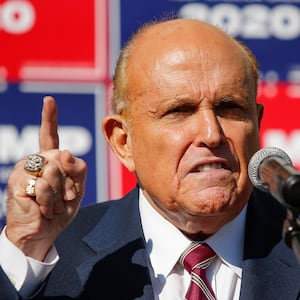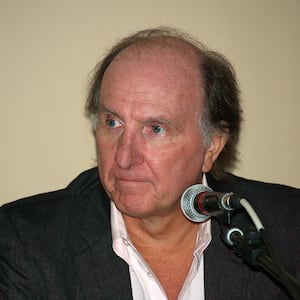Rudy Giuliani's only client may have left the White House, but the former prosecutor's Jan. 6 call for "trial by combat" means he'll be under scrutiny as the impeachment trial and FBI investigation of the plotting of that day’s insurrection unfold. It's not the first time the bedraggled former mayor played a role in a racist riot or dirty tricks campaign.
These and a litany of other sins were itemized in a thorough investigation of himself–auto-oppo research—that Rudy commissioned when he was running for mayor in 1993. That character assessment was so damaging he ordered all copies destroyed. In fact, he made the campaign research director who wrote the study sit down at each computer at which it had been read and delete the files. That's a lifetime – and several reputation implosions ago.
For decades the Vulnerability Study, as it was called, existed in the minds of the NYC press corps like the white whale. Everyone had heard of it. No one had seen the full copy. Except, of course, relentless Village Voice muckraker Wayne Barrett, who obtained it from a source in a late-night, side-of-the-highway handoff while he was writing Rudy! An Investigative Biography of Rudy Giuliani. The Vulnerability Study—divided into clear-eyed assessments of his vulnerabilities in politics, his Department of Justice career and his time in private practice and including such subheads as "Racist," "Shameless Publicity Seeker," and "Overzealousness"—exudes a certain soothsayer quality now, the past chuckling into the present. It reveals that the operatic madness of the last couple years isn't new.
Among the items highlighted in the report was Rudy's role in the infamous 1992 NYPD protest turned riot. Standing on a flatbed truck, Rudy gave a shrieking, curse-laden speech to a sea of riled-up cops who opposed the establishment of an all-civilian police oversight board. Armed off-duty police stormed over barricades, blocked the entrance to City Hall, disrupted traffic on the Brooklyn Bridge, assaulted reporters and harassed two Black city council members. Carrying signs with racist caricatures of the African American mayor, David Dinkins, and shouting racial slurs, the 10,000 off-duty police caused thousands of dollars of property damage, stomped on cars until they dented them and battered the windows of City Hall.
His closest advisers argued, "His inflammatory, profanity laced screeching before thousands of drunk, gun toting off duty New York City cops turned an overtly racist police rally into a dangerous police riot."
Years earlier, while serving as deputy to the Associate Attorney General in the Ford administration, Rudy oversaw dirty tricks operations that would have done Roger Stone proud—and when he got called out for it, he tried to scuttle the career of the man who objected to his heavy-handed methods. In a sprawling tax evasion case called Operation Haven, federal agents under Rudy's control illegally obtained evidence by paying an informant to break into the Miami hotel room of the deputy director of a Bahamian bank and remove documents from his briefcase. While the bank official dined with another informant in what he thought was a date, the documents were photocopied and then returned to the hotel room. In the same investigation Rudy had IRS investigators track the sex life of a Florida judge and steal a Rolodex stuffed with potential leads. The tainted evidence hobbled a major investigation. When IRS Commissioner Donald Alexander put a stop to the overzealous caper, Rudy tried to convene a grand jury investigation of him, nearly ruining Alexander's career. This so alarmed Rudy's 1993 campaign staff that they feared it would derail his chance at the mayoralty. "Giuliani could be in big trouble if a wily reporter goes out and finds Mr. Alexander," a campaign aide wrote.
Rudy's wheedling wrong number voicemail begging Rep. Tommy Tuberville (R-AL) to slow down the electoral vote certification just hours after the attack on the Capitol brought to mind Rudy's shady 1981 last-minute huddle with the general counsel for military contractor McDonnell-Douglas. Four executives at the firm had been indicted on federal bribery charges. After the firm's lawyer met with Rudy, the criminal charges were dropped and the company paid a fine, much to the consternation of investigators who'd been working the case for years. The meeting prompted an investigation by the Justice Department's Office of Professional Responsibility. It determined that "no law, regulation, order or standard of conduct was violated."
The full document Barrett was handed on that dark highway shoulder sits now in a box among the reporter's papers at the Briscoe Center for American History at the University of Texas at Austin. Last spring a longtime source and collaborator of Barrett's uncovered another copy, deep in a closet in his Bronx apartment. The 464-page study is a taxonomy of Rudy's failures and personality defects.
The instinct to investigate himself and then destroy the results speaks to something compelling in this hollow man. But maybe all these years later what's most remarkable about the Vulnerability Study is that most of its nearly 500 pages are citations from newspaper articles. We've always known who Rudy Giuliani is. The problem is we kept forgetting.



